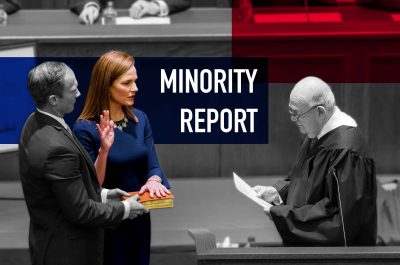From the little I have read about Judge Amy Coney Barrett, President Donald Trump’s nominee to the Supreme Court of the United States, I think there is a lot on which she and I disagree.
She appreciates the way former Justice Antonin Scalia interpreted the Constitution. I do not. She criticized John Roberts for the Sebelius decision. I think Roberts was right in asserting that the individual mandate was a tax, and thus, Congress was allowed to exercise power because of the U.S. Constitution’s Taxing and Spending Clause.
She is fine with being nominated to the Supreme Court before the election by the current president. I think the next Supreme Court justice should be nominated by the candidate who wins the election in November.
Democrats should feel free to attack her on the substance of the above issues and more. However, I would ask that they eschew attacking one thing: Barrett’s Catholicism.

Before I speak more about the history of anti-Catholic prejudice in America, I want to clarify that I am not saying Catholics face more discrimination than other groups in the country — this is not a discrimination contest.
I am asking Democrats to lay off religious blows below the belt because they are likely to be more hostile to a Trump Supreme Court nominee than they would be with a Democratic president’s nominee. Still, I am not suggesting that Democrats are more anti-Catholic than Republicans are.
I understand the temptation for Democrats. They want to defend Roe v. Wade by ensuring that Barrett does not join the Court and make it a conservative majority. The Court would then have the potential to overrule the constitutional right to an abortion.
Targeting her Catholicism would be easy. The Catholic Church strongly opposes abortion. Democrats could try to use messaging to their advantage by arguing that Barrett’s Catholicism prevents her from ruling justly on abortion rights.
However, Democrats should avoid such pernicious criticisms.
At Barrett’s Court of Appeals confirmation hearing in 2017, Sen. Diane Feinstein, D-Calif., said “the dogma lives loudly within” Barrett.
I hope no one makes a remark such as Feinstein’s at Barrett’s Supreme Court confirmation hearings. Feinstein’s comment parrots the erroneous idea that because someone is a Catholic, they cannot think for themselves and will be a puppet of the Catholic Church.
Anti-Catholicism is a prejudice that harmed former President John F. Kennedy and presidential candidate Al Smith, both of whom were Catholic, as they sought the presidency.
Kennedy was pressured to reassure non-Catholics that he would be America’s president and not a tool of the Vatican. Kennedy said he believed in an America “where no public official either requests or accepts instructions on public policy from the Pope.”
Kennedy’s having to reassure people about such a ridiculous issue is proof that the depth of prejudice against Catholics ran deep while he was campaigning in 1960.
One of the most significant factors in Smith’s 1928 defeat was his Catholic faith. There were baseless attacks about Smith having loyalty to the Pope. More ludicrous were suggestions that Smith would build a tunnel between Rome and the White House for the Holy Father’s express transportation to the Oval Office.
In his presidential nomination acceptance speech, Smith promised not to be influenced by a person’s religious affiliations. It seems that Catholics are one of the few groups required to say on the record that they will not give preferential treatment to their faith, or the followers of their faith, as they execute their duties.
I hope I do not hear any requests for Barrett to reaffirm her allegiance to the U.S. and repudiate the Catholic Church. Such a request, or even the suggestion of an existing dual loyalty, is outrageous.
No person should have their faith used against them as proof that they are or are not loyal to America. I hope Democrats do not spout the dual loyalty lie and preserve the last acceptable prejudice.
So if you are willing to use Barrett’s Catholicism against her during her confirmation process, ask yourself if you would do the same to a Protestant, a Jew or a Muslim.



















































































































